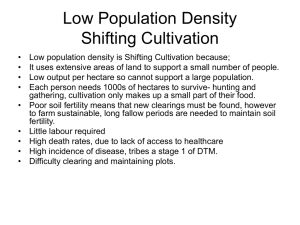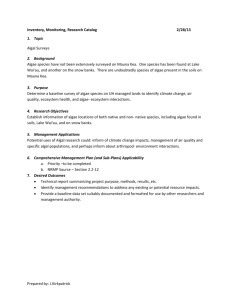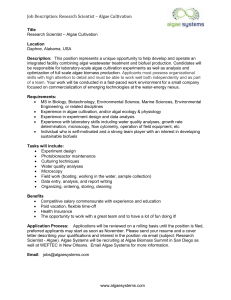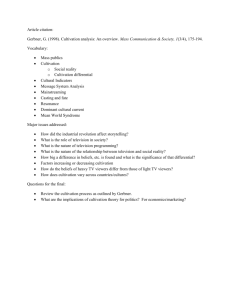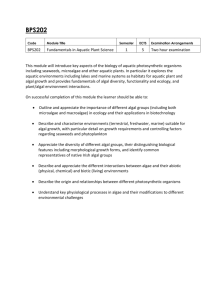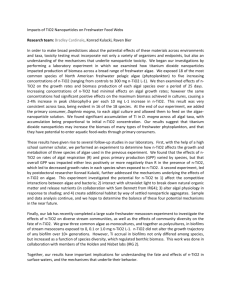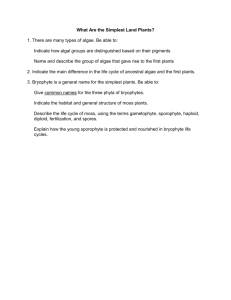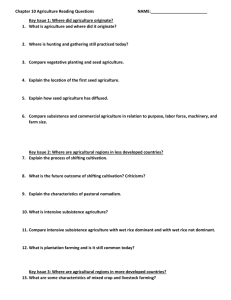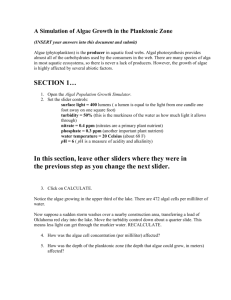Philip T. Pienkos - Biofuels & Bioenergy
advertisement
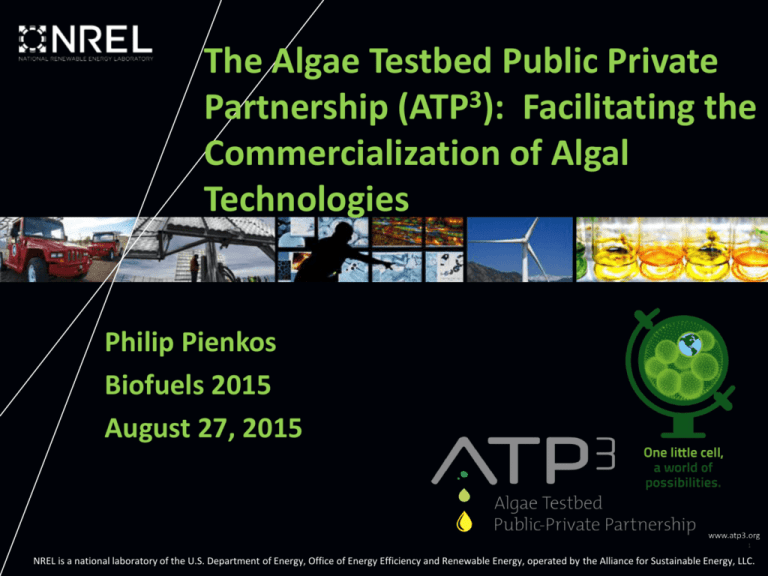
The Algae Testbed Public Private Partnership (ATP3): Facilitating the Commercialization of Algal Technologies Philip Pienkos Biofuels 2015 August 27, 2015 NREL is a national laboratory of the U.S. Department of Energy, Office of Energy Efficiency and Renewable Energy, operated by the Alliance for Sustainable Energy, LLC. Goal Statement Mission: Establish a sustainable network of regional testbeds that empowers knowledge creation and dissemination within the algal R&D community, facilitates innovation, and accelerates growth of the nascent algal biofuels and bioproducts industry. Goals: - Increase stakeholder access to high quality, outdoor cultivation and laboratory facilities - Support DOE’s techno-economic, sustainability, and resource modeling activities - Help to close critical knowledge gaps and inform robust analyses of the state of technology for producing algal biofuels and bioproducts ATP3’s Two Main Objectives Collaborative Open Testbeds • Establish network of facilities for the algal research community and increase stakeholder access to real-world conditions for algal biomass production. • Accelerate applied algae research, development, investment, and commercial applications for biofuel and bioproduct feedstock production. High Impact Data from Long Term Algal Cultivation Trials • Design and implement a unified experimental program across different regional, seasonal, environmental and operational conditions comparing promising production strains at meaningful scales. • Data made widely available to the TEA/LCA and overall research community allowing for a robust analysis of the state of technology. 3 Collaborative Open Testbeds ATP3 offers access to a wide array of services, capabilities and facilities: Stakeholder Access to Facilities Testbed locations Regional testbed facilities for the partnership are physically located in Arizona, Hawaii, California, Georgia, and Florida. Why Engage with ATP3? Fuels 5 Entry to US market ATP3: Testbeds Open for Business • Project Activities: biomass supply (1kg-100’s kg), equipment testing, analytical testing, culture maintenance and consultation services to academia, industry and national labs • Project Categories: fee-for service activities, sponsored research, and subsidized projects through ATP3 Support Program • Project Benefits: access to facilities to drive technology R&D, de-risk and validate technological innovations Variety of independent and vertically integrated downstream harvesting unit ops Provide service to ATP3 customers - Produce algal biomass in the form of slurry, paste and dry powers - Serve as baseline technologies for the improvement of future harvesting/dewatering and oil extraction processes (Valicor and OpenAlgae platforms) Collaborative Open Testbeds: Site Access and Customer Management ATP3 Offers Support Program The Goal – encourage and enable small businesses, entrepreneurs and underfunded academic researchers to pursue new approaches to solving technical issues associated with commercialization of algae biofuels, processes, and co-products. What is it ? - Access to laboratory, outdoor facilities and resource support for novel projects - ATP3 provides subsidized access to testbed facilities, technical expertise, and M&S - Preference for support will be given to: • • • • Short-term projects ranging from 1-3 months (typical project target $10K-$30K) Researchers willing to share data and results widely through publication Projects that leverage on-going activities already occurring (e.g., UFS/AFS) Vetted through internal TAB/Exec team review Easy to start the process: Visit ATP3.org and fill out an expression of interest form Initial cohort of support projects Support may include: includes: Biomass (whole, extracted, oil) Novel cultivars for flue gas capture high value products (University of Delaware) Carbon management and delivery (LBNL) AD with LEA (Cal Poly) Feed-forward nutrient control (Penn State) VAL for CO2/O2 and integrated culture hydraulics and harvest (Searen LLC) Rolling acceptance/review of applications Access to cultivation & downstream equipment (eq. transport, install/removal) Access to R&D, production & analytical expertise Access to laboratory and office space Travel stipends to testbed (currently limited to academic clients) 9 Open Collaborative Testbed: Summary 10 Education & Training Workshops • • • • ATP3 has hosted 7 quarterly educational workshops Over 30 lecture modules Over 15 hands-on field site and laboratory activities Well attended by broad mix of academic and industrial participants • More than 200 participants representing >70 different organizations • 35% Foreign participants • Most recent workshop: Large-Scale Cultivation and Downstream Processing (Nov 3-7th; Mesa, AZ) • “Principles and Processes: Algae Culture Maintenance, Production and Downstream Processing” planned for May 2015 at NREL and CSM in Golden Colorado 11 High Impact Data: Long Term Algal Cultivation Trials ATP3 sets standards and conducts harmonized, rigorous, and objective long term cultivation trials to provide a realistic assessment of the state of technology for algal based biofuels and bioproducts. • Our Unified Field Studies (UFS) at the testbed sites along with our Advanced Field Studies (AFS) enable comparison of promising production strains at meaningful scale across variable conditions • Our Scientific Data Management System and validated, harmonized SOP’s for analytical and production processes ensures data integrity across all sites • Our data from the UFS and AFS will be made publicly available and provide a critical resource to TEA and LCA analysis yielding high impact, validated data Productivity metrics: • Volumetric dry weight • Ash Free dry weight • Lipids • Carbohydrates 12 • Protein Standardization of processes and systems is key to executing meaningful multi-site cultivation trials 13 UFS Strains/Cultivar: Primary Nannochloropsis oceanica (KA32), supplied by Cellana – Not expected to be high productivity but known stable and robust cultivar especially for inland sites – key for establishing baseline seasonal/regional performance • Chlorella vulgaris, (LRB-AZ-1201) supplied by ASU – Known to be less robust (open pond), but available and importable to HI, high performer in PBR’s • Additional strains to be used for AFS (and as part of UFS in 2015) – Scenedesmus acutus – Desmodesmus sp. • Representative cultivars for fuel and high value production (feed, omega3’s) – Substantial historical data for all strains (faster project startup) – Unencumbered with little restrictions on strain/biomass distribution to third parties 14 2014 Seasons: Unified Field Studies Spring 2014/2015 Unified Field Study M Experimental Outline 1 A Summer M J J Fall A S O Winter N D J F 2 3 4 5 6 7 8 9 10 11 12 13 14 15 16 17 18 19 20 21 22 23 24 25 26 27 28 29 30 31 32 33 34 35 36 37 38 39 40 41 42 43 44 45 46 47 48 49 50 51 52 Seed production/pond prep Nannochloropsis Only Strain switch Chlorella Only Data sharing/reports One strain in panels, Other strain in columns • Prime trials: 2015/2016 Unified FieldGoal Study M forA year M 1 UFS J J A Establish S O N D J F Experimental Outline 1 2 3 4 5 6 7 8 9 10Baseline 11 12 13 14 15 16 17 18 19for 20 21 22 primary 23 24 25 26 27 28 29 30cultivars 31 32 33 34 35 36 37 38 39 40 41 42 43 44 45 46 47 48 49 50 51 52 Seasonal/Regional Seed production/pond prep • Season = 12 weeks Dln Rate Nannochloropsis Chlorella Dln Rate N Source Depth Dln Rate pH PW Speed Dln Rate Strain TBD Rate – Target ofDln10-11 weeks dedicated to cultivation in ponds Data sharing/reports – Seasons ran two strains in series – 2 weeks for initial grow out, and a target of min of 3 weeks of cultivation per strain after growout. Run under conditions where N:P and Ci not limited – <1 week to turn ponds for next strain 15 – Repeat Four Seasons of Production Runs N. oceanica KA32, ASU Spring Summer diatom Fall Winter Four Seasons of Production Runs C. vulgaris LRB-AZ-1201, ASU Spring Summer Fall Winter Poteriochromonas Harvest Yield Productivity Data Nannochloropsis oceanica KA32 Clear seasonal effect at every site with distinctive variations Harvest Period Experiment Duration Challenges for N. oceanica KA32 19 Challenges for C. vulgaris LRB-AZ-1201 ASU Cal Poly 16 First counts for pond 12, 15 and 16 on 2/11 First counts for Pond 11 on 2/13 First counts for Pond 13, 14 on 2/16 20 Advanced Diagnostics: Metagenomics of ATP3 Pond Samples Sample acquisition • • • • Harvesting by centrifugation: 50 mL samples Resuspension in RNALater Storage at 4° overnight followed by -20° Shipment on wet ice. 21 Advanced Diagnostics Summary • Workflow for sequencing high throughput 16S and 18S metagenomic samples established • New bioinformatics software pipeline which is – fast and efficient to carry out the analysis and producing user friendly outputs – pipelines used and developed: • MAGPie (Metagenomics and Amplicon Sequencing Pipeline) • & RapTOR (Rapid Threat Organism Recognition) • In process - developing and improving our data-mining tools for in-depth analysis of these datasets • Progressing through summer and fall samples now • Data sets will be made available with the cultivation data 22 Public Access to Data Using the existing infrastructure and expertise of OpenEI.org will provide a rapid, robust, and lowcost solution for making the ATP3 datasets public. Initial summary data and protocols available – detail curated data for year 1 of UFS to be complete this summer. Summary ATP3 has established a users facility across five sites in the US to increase stakeholder access to high quality, outdoor cultivation and laboratory facilities. Our fee structure and site access plan can provide customers with the appropriate framework for conducting business. Our education program provides hands on wet lab experience in algal cultivation and down stream processing. Our internal research program has established a validated framework for implementing rigorous, long-term multi-site cultivation trials We have generated data to determine the effects of regional, seasonal, environmental variation that is to be expected for a national (international) deployment of algae cultivation We have established baseline performance across multiple seasons and have begun to expand that with additional strains and cultivation systems into CY 2016. By making data publically available, we will enable the modeling community (biomass productivity, TEA, LCA and RA) to refine their assessments and help understand the path to commercializaton. 24 ATP3 partners 25 Acknowledgements ASU Gary Dirks John McGowen Thomas Dempster Milt Sommerfeld William Brandt Jessica Cheng Jordan McAllister Sarah Arrowsmith David Cardello Theresa Rosov Mary Cuevas Maria Bautista Jeffrey Prairie Richard Malloy Xuezhi Zhang Henri Gerken Pierre Wensel Linda Boedeker Sarah Mason Travis Johnson Sydney Lines UTEX Schonna Manning Jerry Brand Valicor Renewables Kiran Kadam Brian Goodall NREL Phil Pienkos Lieve Laurens Ed Wolfrum David Crocker Ryan Davis Stefanie Van Wychen Eric Knoshaug Sandia National Labs Ron Pate Todd Lane Patricia Gharagozloo Thomas Reichardt Jessica Drewry Pamela Lane Cellana Valerie Harmon Martin Sabarsky Emily Knurek Kate Evans Peter Prentiss Reyna Javar Kari Wolff Keao Bishop-Yuan Lynn Griswold Christina Boyko Charlie O’Kelley Kelli Yamane, BS Radu Mihaila, MS Egan Rowe Cal Poly Tryg Lundquist Braden Crowe Eric Nicolai Garrett Murawsky Ruth Spierling Open Algae Peter Kipp Hoyt Thompson ASU Undergrads Wyatt Western Mariah Patton Carlos Luna Delaney De Hertogh Shaylin Mcghee Caden Offield GT Undergrads Fariha Hassan Jerry Duncan Frazier Woodruff Shusuke Doi Hao Fu Patricia PenalverArgueso Allison Dunbar Allison Carr Florida Algae Steven Schlosser Chris Withstandley Mary Riddle Nancy Pham Ho (FIT) Commercial Algae Management Albert Vitale Robert Vitale Sichoon Park Priya Pradeep Catherine Achukwu Christine Yi Asmita Narode Chunyan Xu Yuankun Zhao Kangyan Wu Sarasija Cheruvu CP Undergrads Aydee Melgar Gulce Ozturk Kaitlyn Jones Michael Antoine Trung K Tran Jake Bender Heather Freed Daniel McBroom Michele Hendrickson Brandon Miller Georgia Tech Yongsheng Chen Steven Van Ginkel Thomas Igou Zixuan Hu Terry Snell Gerard Nguyen Deven Diliberto Jack Sunderland Dan Averbuj Ann Marie Sequeira Lauren Miller Michele Hendrickson Emily Wang Jack Sunderland Ann Marie Sequeira Soroush Aboutalebi Lauren Miller Samantha Lui Michele Hendrickson Gabriella Campos Will Briles Letty Thottathil Marissa License Sam Cronin Eric Krikorian Javier Garcia Esme Diego Brett Kelley Sarah Atmadja Nicholas Hardy Ryan Stump Anna Klavins Cris Swain Jessica Duffey Ryan Yanda Taylor Gater Rick Brundage Hunter Lawless Jared Stine Sophia De Guia Joshua Tenhet Samantha Bock Leland Lam
